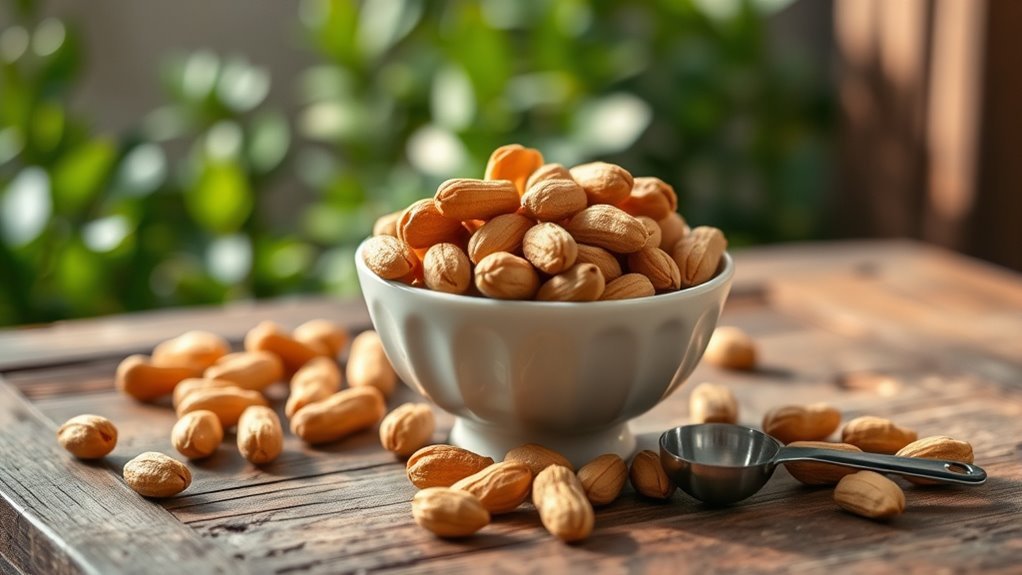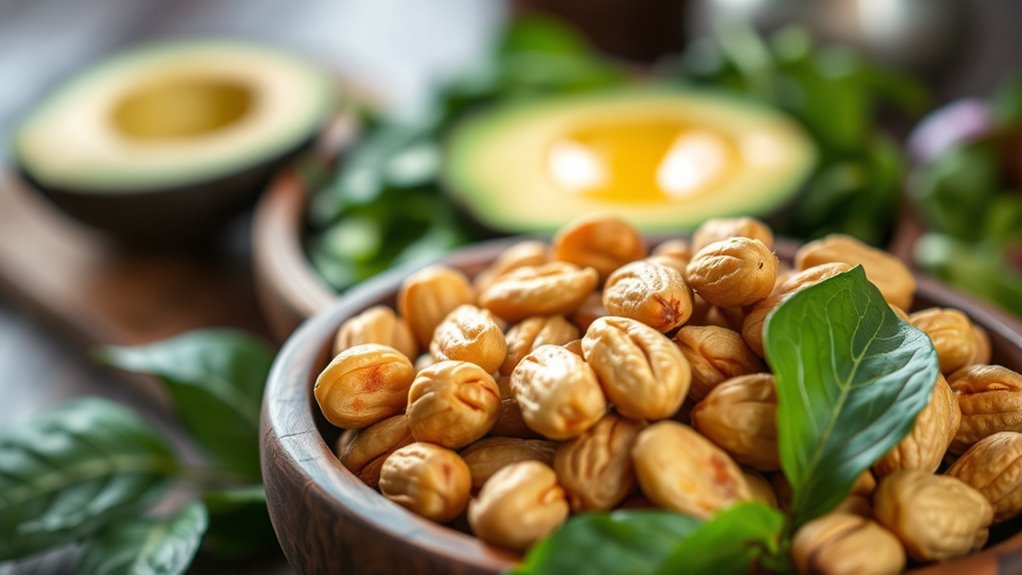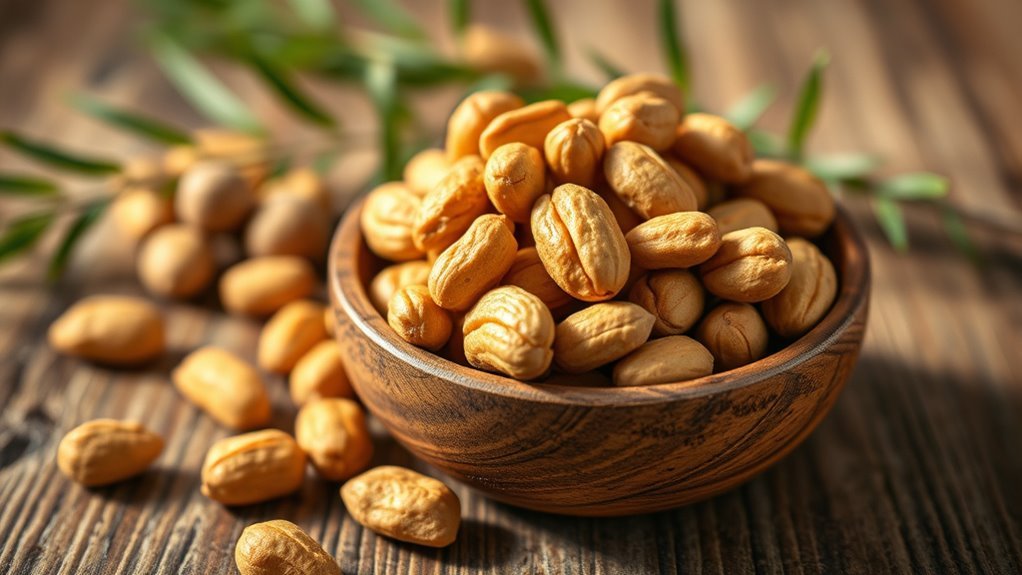Yes, you can enjoy peanuts on a keto diet! They’re low in carbs, with about 6 grams per ounce, and are rich in healthy fats that support heart health. Just be mindful of portions, as they can quickly add up; stick to about 1 ounce at a time. While many can benefit from their nutrient density, individual responses may vary. If you’re curious about how to incorporate peanuts into your meals, there’s plenty more to explore!
Nutritional Profile of Peanuts

When considering snacks on a keto diet, peanuts offer a compelling nutritional profile. These legumes are packed with nutrient density, providing essential vitamins and minerals while keeping calories in check. One of the standout features of peanuts is their high dietary fiber content, which supports digestive health and can help keep you feeling full longer. A one-ounce serving of peanuts contains about 2.4 grams of fiber, contributing to your daily intake and making them a satisfying choice. Additionally, peanuts are rich in healthy fats, primarily monounsaturated fats, which can promote heart health. By incorporating peanuts into your diet, you can enjoy a crunchy, flavorful snack that aligns with your keto goals while supporting overall well-being. However, it’s important to be mindful of portion sizes, as monitoring macronutrient intake is crucial for maintaining ketosis.
Carbohydrate Content and Ketosis

Peanuts can be a satisfying snack option on a keto diet, but it’s important to pay attention to their carbohydrate content to maintain ketosis. While they contain some carbs, their fiber content helps mitigate their impact on carbohydrate metabolism. Here are a few key points to take into account:
- Peanuts have about 6 grams of carbs per ounce, making them relatively low-carb.
- The fiber in peanuts can help reduce the net carb count, aiding in maintaining ketosis.
- Monitor portion sizes to guarantee you don’t exceed your daily carb limit. Additionally, portion control is vital for keeping carb intake in check.
Healthy Fats in Peanuts

One ounce of peanuts contains about 14 grams of healthy fats, making them an excellent choice for those on a keto diet. These fats primarily consist of monounsaturated and polyunsaturated fats, which are known to support heart health and reduce inflammation. Incorporating peanuts into your diet provides a satisfying crunch while keeping your carb intake low, making them one of the best healthy fat sources. When you’re looking for keto-friendly snacks, peanuts can be a great option, as they help you stay full and energized. Plus, they’re versatile; you can enjoy them on their own or as part of a recipe. Embracing peanuts can enhance your keto experience without sacrificing flavor or nutrition. Additionally, their low net carbs make them an ideal snack choice for maintaining ketosis.
Portion Control: How Much Is Too Much?
When you’re incorporating peanuts into your keto diet, knowing the recommended serving size is vital. Each serving can greatly impact your carb counts, so tracking your intake is essential to stay within your daily limits. Understanding how much is too much can help you enjoy peanuts without derailing your keto goals. Additionally, it’s important to remember that portion control is crucial due to their calorie density.
Recommended Serving Size
Finding the right portion size for peanuts on a keto diet is essential to staying within your carb limits while enjoying their rich flavor and healthy fats. The recommended serving size for peanuts is typically around 1 ounce (about 28 grams). Sticking to this serving can help you manage your carb intake effectively. Here are some portion guidelines to keep in mind:
- Measure out a small handful (about 1 ounce) to avoid overindulging.
- Consider using peanuts as a topping for salads or dishes to control the amount.
- Keep a food diary to track how many peanuts you’re eating.
Carb Counts Matter
Many people underestimate how quickly carbs can add up, especially with snacks like peanuts. While peanuts offer healthy fats and protein, their carb counts are essential for maintaining keto compatibility. If you want to enjoy this tasty snack, consider portion control to stay within your daily carb limits. Additionally, choosing natural peanut butter may provide a healthier alternative that fits your keto diet.
Here’s a quick overview of the carb counts in common peanut varieties:
| Peanut Type | Serving Size | Net Carbs (g) |
|---|---|---|
| Raw Peanuts | 1 oz (28g) | 4.7 |
| Roasted Peanuts | 1 oz (28g) | 5.2 |
| Salted Peanuts | 1 oz (28g) | 5.4 |
These nutritional considerations help you savor peanuts without derailing your keto journey. Keep an eye on those portions!
Tracking Your Intake
How do you know if you’re enjoying peanuts within your keto limits? It’s all about tracking your intake and maintaining balance. Here are a few effective tracking methods to keep your peanut consumption in check:
- Measure Portions: Use a kitchen scale or measuring cups to verify you’re not overindulging.
- Log Your Snacks: Keep a food diary or use an app to track your daily intake, including peanuts.
- Set Daily Limits: Decide on a specific number of servings that fit your carb allowance, and stick to it. Additionally, remember that peanut butter contains around 6-8 grams of carbs per two-tablespoon serving, which is essential for maintaining ketosis.
Individual Responses to Peanuts
While some people thrive on peanuts as a protein-rich snack, others may experience digestive discomfort or allergic reactions, highlighting the importance of individual responses to this popular legume. Your individual tolerances can greatly impact how peanuts fit into your keto diet. For instance, some individuals may find that peanuts help maintain stable energy levels, while others might notice adverse metabolic responses, such as spikes in blood sugar or gastrointestinal issues. It’s crucial to listen to your body and assess how peanuts affect you personally. Keeping track of your reactions can guide you in determining if peanuts are a suitable addition to your diet or if you should seek alternative snacks that align better with your keto goals. Additionally, it’s important to consider the nutritional profile of edamame, which offers a low-carb option for those looking to diversify their protein sources.
Potential Benefits of Peanuts on a Keto Diet
Peanuts can offer several benefits when incorporated into a keto diet, particularly due to their unique nutritional profile. These little legumes are packed with healthy fats, making them an excellent choice for keto snacks. Here are some peanut benefits you’ll love:
- High in Healthy Fats: Peanuts contain monounsaturated fats, which support heart health and can help maintain ketosis.
- Protein Powerhouse: They’re a great source of plant-based protein, keeping you full and satisfied while on a low-carb regimen.
- Nutrient-Dense: Peanuts are rich in vitamins and minerals like vitamin E, magnesium, and potassium, contributing to overall wellness.
Alternatives to Peanuts
When you’re looking for alternatives to peanuts on a keto diet, there are several options that can provide similar nutritional benefits without compromising your carbohydrate limits. Almond butter is a creamy choice packed with healthy fats, while sunflower and pumpkin seeds offer a satisfying crunch and are low in carbs. Pecan nuts and macadamia nuts are excellent for snacking, both rich in healthy oils. You can also enjoy coconut flakes for a touch of sweetness without spiking your carb intake. Chia seeds are versatile, great for adding texture to smoothies or puddings, and hazelnuts provide a delightful flavor. These alternatives can help you maintain your keto lifestyle while enjoying a variety of tastes and textures. Additionally, opting for nuts like macadamia nuts can help you stay within your carb limits while reaping the health benefits of nutrient-dense snacks.
Tips for Incorporating Peanuts Into Your Meal Plan
When incorporating peanuts into your meal plan, it’s important to contemplate portion control to stay within your carb limits. You can choose from various peanut butter options that fit a keto diet, ensuring you pick those with minimal added sugars. Additionally, pairing peanuts with low-carb snacks can enhance your meals while keeping your macros in check.
Portion Control Strategies
While incorporating peanuts into your keto meal plan can be a delicious way to add healthy fats and protein, portion control is essential to keep your carb intake in check. Being mindful of portion sizes will help you enjoy peanuts without derailing your progress. Here are some strategies to evaluate:
- Measure servings: Use a food scale or measuring cups to portion out your peanuts, aiming for a serving size of about 1 ounce (28 grams).
- Mindful eating: Slow down and savor each bite to enhance your enjoyment, which can help prevent overeating.
- Pre-pack snacks: Instead of grabbing the whole bag, pack individual servings to make it easier to stick to your desired intake. Additionally, understanding the carb content of foods is essential for making informed choices while following a keto diet.
Peanut Butter Options
Peanut butter can be a versatile and satisfying addition to your keto meal plan, especially since it offers a combination of healthy fats and protein. When choosing peanut butter varieties, look for options with minimal added sugars and no hydrogenated oils. Natural peanut butter, which contains just peanuts and salt, is a great choice. You might also explore other healthy spreads, like almond or macadamia nut butter, for variety. Incorporating peanut butter into smoothies or using it as a dip for low-carb veggies can enhance both taste and nutrition. Just remember to monitor your portions, as the calories can add up quickly. Additionally, sunflower seeds can provide a crunchy alternative to peanut butter while still fitting into your keto lifestyle. Enjoy the freedom of experimenting with these delicious spreads while staying true to your keto lifestyle!
Snack Pairing Ideas
Looking for creative ways to incorporate peanuts into your keto meal plan? Peanuts can be versatile and satisfying, making them perfect for keto snacks. Here are some delicious peanut pairings to try:
- Cheese and Peanuts: Pair a handful of roasted peanuts with your favorite cheese for a protein-packed snack.
- Celery Sticks with Peanut Butter: Spread natural peanut butter on celery sticks for a crunchy, low-carb treat.
- Peanut Trail Mix: Combine peanuts with unsweetened coconut flakes and dark chocolate for a quick, satisfying snack.
These combinations not only enhance flavor but also help keep you on track with your keto goals. Enjoy the freedom of snacking while staying within your dietary preferences!
Frequently Asked Questions
Can Peanut Butter Be Included in a Keto Diet?
Yes, you can include peanut butter in a keto diet, as long as you choose the right brands. Look for keto-friendly brands that offer low-carb options without added sugars. Peanut butter nutrition is generally favorable, containing healthy fats and protein, which can support your keto goals. Just be mindful of portion sizes to keep your carb intake in check. Enjoy your peanut butter while staying true to your dietary preferences!
Are Roasted Peanuts Healthier Than Raw Peanuts?
When comparing roasted peanuts to raw peanuts, roasted ones often have slightly lower nutrient levels due to cooking methods. For example, a study showed that roasting can reduce vitamin E content. However, roasted peanuts might also taste better and encourage healthier snacking habits, leading you to consume more. While both types offer healthy fats and protein, raw peanuts retain more nutrients. Ultimately, your choice might depend on flavor preference and nutritional comparison.
Do Peanuts Cause Inflammation or Allergies?
Peanuts can cause inflammation responses in some individuals, particularly those with peanut allergies. If you’re allergic, consuming peanuts can trigger a severe reaction. Even if you’re not allergic, peanuts can still promote mild inflammation in certain people, depending on their overall health and diet. It is crucial to listen to your body and consult a healthcare professional if you suspect allergies or experience discomfort after eating peanuts. Balancing your diet is key to maintaining health.
Can I Eat Flavored or Salted Peanuts on Keto?
You can eat flavored or salted peanuts on keto, but moderation’s key. Flavored peanuts often contain added sugars or carbs, so it’s important to check the nutrition label. Salted peanuts, however, are typically low in carbs and can fit into your diet. Just be cautious of portion sizes to avoid exceeding your carb limit. Enjoy them as a tasty snack, but always keep an eye on the ingredients to maintain your keto goals!
What Are the Best Ways to Store Peanuts?
To store peanuts properly, keep them in an airtight container in a cool, dark place. This helps maintain their freshness and extends their shelf life. If you’ve opened a package, it’s best to refrigerate them to prevent rancidity. For long-term storage, you can freeze peanuts, which can keep them fresh for up to a year. Just remember to let them thaw before using, so you can enjoy their full flavor and crunch!


